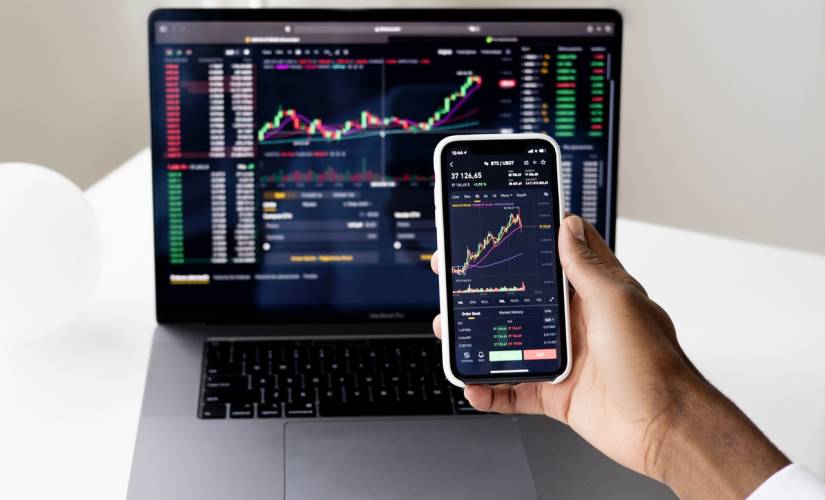The blockchain-IoT marketplace is a blend of blockchain and IoT technology. It has grown in popularity due to the rapid development of technology and communication network. In addition, the blockchain, powered by cryptographic encryption and decentralized networks, uses the IoT platform by using a peer-to-peer network to ensure transparency and security.
The increasing quantity of IoT devices and connections susceptible to cybercrimes has prompted the development of blockchain technology. The benefits of blockchain IoT include the speed of data changes and lower costs, enhanced privacy, and efficient logistics, supply chain, and insurance.
The Internet of Things (IoT) connects people, locations, and products. In doing so, it provides the possibility of value creation and capture. The IoT’s analytics capabilities make use of these data points to translate insights into actions, impacting the business process and resulting in innovative ways of working.
The Powerful Combination of Blockchain and IoT
As per ISG, Blockchain is a distributed ledger technology that allows machine-to-machine transactions to be feasible when combined with IoT. Using a collection of transactions stored in databases, they are verified by multiple sources before being entered into a shared ledger that is distributed to every node. Combining IoT and blockchain enables smart devices to function independently without a central authority, bringing numerous advantages. It can also monitor the ways that devices communicate with each other.
While the decentralization aspect of blockchain technology is an advantage in the design, it could pose problems for IoT because these platforms are based on a hub-and-spoke or client-server architecture that is a central authority. An IoT platform designed to be decentralized can help ensure that it is compatible with blockchain networks; however, it could not be easy to set up IoT sensors to manage their own data storage and computing as they depend on storage resources and central computing.
Integration of Blockchain and IoT Will Propel the Market in Coming Years
Although blockchain and IoT are both strong combined, the combination of these two technologies can be used by businesses. A study conducted by Aftrex Market Research in 2018 discovered that the total Blockchain and IoT market could grow to $254.31 billion in 2026. Below are five advantages of IoT and blockchain technology that will boost the market’s expansion in the years ahead.
Blockchain for Accelerated Data Change
Based on Aftrex Market Research, one of the major benefits of combining IoT and blockchain has been faster data changes. However, according to reports, the blockchain’s current implementation isn’t without its drawbacks in this aspect because it limits the number of transactions performed per second. Therefore, a more business-grade solution, such as a permission-based blockchain, is required to handle the volume of data needed, devices that are part of the IoT, and the speed of transactions between two parties.
A blockchain that reduces the time needed to validate transactions by using trusted nodes is crucial for coping with the demands on IoT performance and can manage IoT’s speedy IoT information exchange.
Improved Security with Blockchain
Security is among blockchain’s primary advantages due to its capability to validate the information and ensure that it is from a reliable source. Due to the large number of devices that are part of the IoT, this feature is especially beneficial. The combination of IoT and technology could help strengthen privacy agreements and improve communications security.
This isn’t just for devices – it’s also humans to humans, devices to devices, and devices to humans. This trusted ledger easily displays who can access the account and who’s making transactions. A log of every transaction is an important advantage. Enterprises currently using an amalgamation of blockchains and IoT frequently rely on security measures such as device authentication, but this is only the beginning of the Iceberg.
More Efficient Supply Chain
One of the main goals for many businesses is to make the supply chain more effective. But, many issues in the global economy hinder this process. Removing the middleman blockchain and IoT can enhance the efficiency of supply chains and speed, accelerating transactions while reducing costs. Since the blockchain serves as a validator, to some extent, non-trusted parties can share data directly, eliminating the cost associated with each hop.
Room for Growth With Blockchainn
The use of IoT-based blockchain technology isn’t yet widely used due to operational issues and technical issues. For example, scalability and storage are two major problems with blockchain systems that keep an extensive central ledger. Storing the ledger on edger nodes is inefficient because smart devices at the edge aren’t capable of handling large amounts of computing power or storing large amounts of data.
Although the concept of IoT-blockchain technology remains in its infancy, it will be a major factor over the next few years. The implementation of standards and regulations and security guidelines will help encourage the use of IoT blockchain technology. In addition, with new standards of peer-to-peer communications and data transparency, blockchain could provide a higher level of security for the web.
Lower Costs
The most highly acclaimed benefit for companies is the capability to cut operational expenses. Blockchain lets data be transmitted on a peer-to-peer basis, with no centralization of control, which reduces the cost of business. Building a highly reliable centralized infrastructure is likely to cost a lot. Decentralization is an efficient way to eliminate single sources of failure and address the size of IoT.
Streamlines Accounting
Accounting is among an organization’s primary departments that can benefit immediately from the increased transparency offered by blockchain and IoT. First, companies must understand what they are sharing/exchanging data/money over a linear, time-stamped chain.
How Blockchain is Accelerating the Potential of IoT?
The blockchain is a great technology with immense potential to speed up getting IoT working effectively. Because security is the main concern of IoT that has prevented the widespread adoption of IoT. IoT devices are often plagued by security flaws, making them a prime target of Distributed Denial of Service (DDoS) attacks. These are the main concerns of blockchain-related IoT devices:
Tamper Proof
The distributed ledger used in the blockchain system is secure against tampering. It removes the need to trust the parties involved and provides the necessary security to devices or platforms, improving the user experience and reducing the amount of work.
Autonomy
Through the integration between IoT and blockchain networks, gadgets will have the ability to exchange information without having to make use of numerous servers. Additionally, it will ensure that there is no failure at any one node within the network, which could result in the shutdown of the entire network.
Robust Level of Encryption
The use of blockchain for storing IoT data will add a layer of protection that hackers require to change within all blocks of the chain to gain entry to the network. In addition, blockchain offers a higher level of security. Hence making it difficult to modify the existing data records and even more difficult.
Decentralization of Networks
Because of the Decentralized approach, using the internet of things network will help solve many of the problems. Such as Peer to Peer communication models to handle billions of transactions between the devices. Also drastically reducing the cost of establishing and maintaining the huge central data center.
Trust and Assurance
By creating trust among parties involved, blockchain could help IoT businesses cut costs. Hence eliminating processing expenses associated with IoT gateways (e.g., traditional protocols, hardware, or communications overhead costs).
The Key Takeaway
According to an August 2018 Twitter survey, 57% of those who participated stated that they would never use blockchain technology. In contrast, only 12% of participants in the survey have used distributed ledger technology.
Based on the analysis of Leone, Blockchain and IoT could be an amazing combination. But, we have some time before this innovative business tool will become commonplace in enterprise technology. Therefore, it is advisable to begin planning for this now.
Featured Image Credit: Photo by Anna Nekrashevich; Pexels; Thank you!





